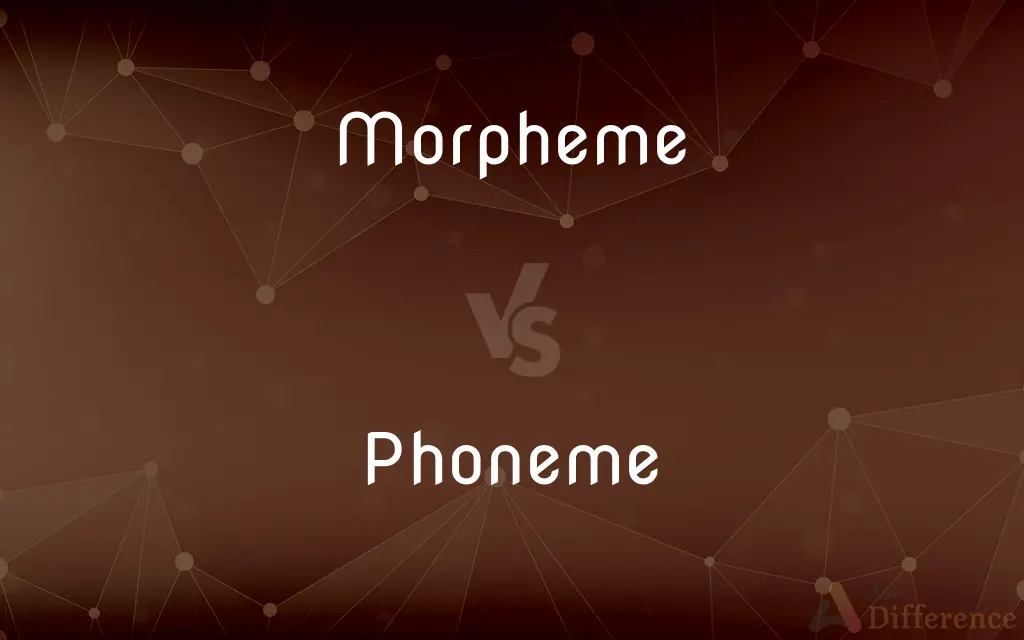Morpheme vs. Phoneme — What's the Difference?
Edited by Tayyaba Rehman — By Fiza Rafique — Updated on September 25, 2023
A morpheme is the smallest grammatical unit in a language, while a phoneme is the smallest distinctive sound unit.

Difference Between Morpheme and Phoneme
Table of Contents
ADVERTISEMENT
Key Differences
In the realm of linguistics, morpheme and phoneme are foundational concepts. A morpheme is essentially the smallest unit of a language that holds meaning. For instance, the word "unhappiness" consists of three morphemes: "un-", "happy", and "-ness". Phoneme, on the other hand, pertains to the domain of sounds. It is the smallest unit of sound that can distinguish one word from another. For example, the difference in the initial sounds of "pat" and "bat" is a result of the phonemes /p/ and /b/ respectively.
When analyzing language, understanding the distinction between morpheme and phoneme is crucial. Morphemes can be words themselves, or they can be parts of words, like prefixes or suffixes. These units provide the foundation upon which words are built and convey specific meanings. Phonemes, however, do not have inherent meaning. They function to differentiate words but aren't tied to specific semantic content.
The relationship between morpheme and phoneme becomes clearer when considering how languages evolve. Morphemes shift in response to cultural or contextual changes that necessitate new meanings. Phonemes, conversely, might change as accents evolve or as languages come into contact with one another. The shifts in phonemes don't inherently change the meaning of the words, but they can influence pronunciation.
In summary, while both morphemes and phonemes are elemental units in linguistics, they operate in different capacities. Morphemes are the building blocks of meaning, and phonemes are the building blocks of sound. Both play essential roles in shaping the complexities and nuances of human language.
Comparison Chart
Definition
Smallest meaningful unit in language
Smallest distinctive sound unit
ADVERTISEMENT
Function
Conveys meaning
Differentiates words
Examples
"un-", "happy", "-ness" in "unhappiness"
/p/ and /b/ in "pat" and "bat"
Relation to Words
Can be whole words or parts of words
Sounds that make up words
Change Impact
Changes can create new meanings or nuances in language
Changes affect pronunciation, not meaning
Compare with Definitions
Morpheme
Not always a word, but always carries meaning.
-ed is a morpheme indicating past tense.
Phoneme
Abstract representation of speech sounds.
/t/ and /d/ are distinct phonemes in English.
Morpheme
Smallest unit of meaning in a language.
The word dogs has two morphemes: dog and -s.
Phoneme
Can change word meaning if substituted.
Changing the phoneme /m/ to /n/ in mat results in nat.
Morpheme
Can be a prefix, root, or suffix.
In unhappiness, un- is a morpheme.
Phoneme
Not related to alphabetic letters.
The word shoe starts with the phoneme /ʃ/.
Morpheme
Can be free or bound.
Book is a free morpheme, while -ing is a bound morpheme.
Phoneme
Smallest sound unit that can differentiate meaning.
The phoneme /r/ distinguishes rat from bat.
Morpheme
Constituent parts that create complex words.
Unbelievable consists of three morphemes: un-, believe, and -able.
Phoneme
In phonology and linguistics, a phoneme is a unit of sound that can distinguish one word from another in a particular language. For example, in most dialects of English, with the notable exception of the West Midlands and the north-west of England, the sound patterns (sin) and (sing) are two separate words that are distinguished by the substitution of one phoneme, /n/, for another phoneme, /ŋ/.
Morpheme
A morpheme is the smallest meaningful lexical item in a language. A morpheme is not necessarily the same as a word.
Phoneme
Any of the perceptually distinct units of sound in a specified language that distinguish one word from another, for example p, b, d, and t in the English words pad, pat, bad, and bat.
Morpheme
A meaningful linguistic unit that cannot be divided into smaller meaningful parts. The word man and the suffix -ed (as in walked) are morphemes.
Phoneme
The smallest phonetic unit in a language that is capable of conveying a distinction in meaning, as the m of mat and the b of bat in English.
Morpheme
(linguistic morphology) The smallest linguistic unit within a word that can carry a meaning.
Phoneme
An indivisible unit of sound in a given language. A phoneme is an abstraction of the physical speech sounds (phones) and may encompass several different phones.
Morpheme
The smallest unit of meaning of a language, which cannot be divided into smaller parts carrying meaning; it is usually smaller than a single wordform, such as the -ed morpheme of verbs in the past tense or the -s morpheme of nouns in the plural form.
Phoneme
(linguistics) one of a small set of speech sounds that are distinguished by the speakers of a particular language
Morpheme
Minimal meaningful language unit; it cannot be divided into smaller meaningful units
Phoneme
Fundamental to the pronunciation of words.
The word thin contains the phoneme /θ/.
Common Curiosities
How many morphemes are in the word "unhappily"?
Three: "un-", "happy", and "-ly".
What is a morpheme?
A morpheme is the smallest meaningful unit in a language.
Do all languages have the same phonemes?
No, different languages have different sets of phonemes.
Are phonemes and letters the same?
No, phonemes are sound units, while letters are written symbols. One letter can represent multiple phonemes and vice versa.
Why are phonemes important in linguistics?
Phonemes are crucial for understanding pronunciation, accents, and the sound structures of languages.
How does a phoneme function in language?
A phoneme is the smallest sound unit that can differentiate one word from another.
Can a morpheme stand alone?
Yes, free morphemes can stand alone as words, while bound morphemes cannot.
Can a word have multiple morphemes?
Yes, words can be made up of multiple morphemes, like "unbelievable".
What's the difference between a morpheme and a syllable?
A morpheme is a unit of meaning, while a syllable is a unit of sound.
Is "pre-" in "preview" a morpheme?
Yes, "pre-" is a prefix morpheme meaning "before".
Is the difference between /s/ and /z/ a phonemic difference?
Yes, in English, /s/ and /z/ are distinct phonemes.
Are all prefixes and suffixes morphemes?
Yes, prefixes and suffixes are types of bound morphemes.
What is the relationship between morphemes and words?
Words are made up of one or more morphemes that convey meaning.
How can I identify different phonemes in a word?
Phonemes are identified by changes in sound that can alter the meaning of a word.
Do phonemes carry specific meanings?
No, phonemes differentiate words but don't have inherent meaning.
Share Your Discovery

Previous Comparison
Totaling vs. Total
Next Comparison
Epiblast vs. HypoblastAuthor Spotlight
Written by
Fiza RafiqueFiza Rafique is a skilled content writer at AskDifference.com, where she meticulously refines and enhances written pieces. Drawing from her vast editorial expertise, Fiza ensures clarity, accuracy, and precision in every article. Passionate about language, she continually seeks to elevate the quality of content for readers worldwide.
Edited by
Tayyaba RehmanTayyaba Rehman is a distinguished writer, currently serving as a primary contributor to askdifference.com. As a researcher in semantics and etymology, Tayyaba's passion for the complexity of languages and their distinctions has found a perfect home on the platform. Tayyaba delves into the intricacies of language, distinguishing between commonly confused words and phrases, thereby providing clarity for readers worldwide.














































